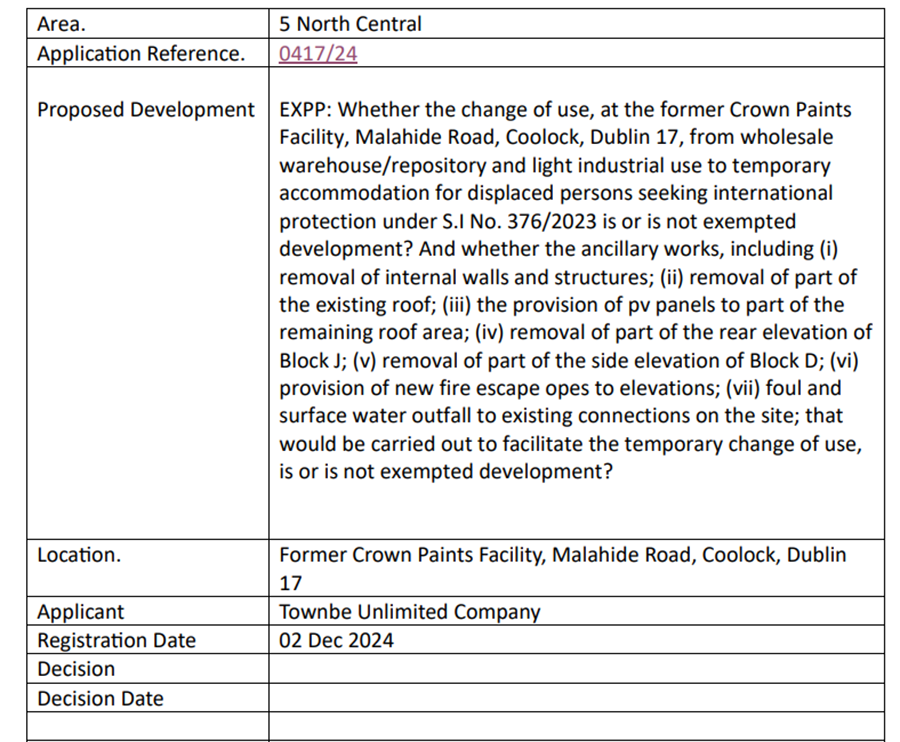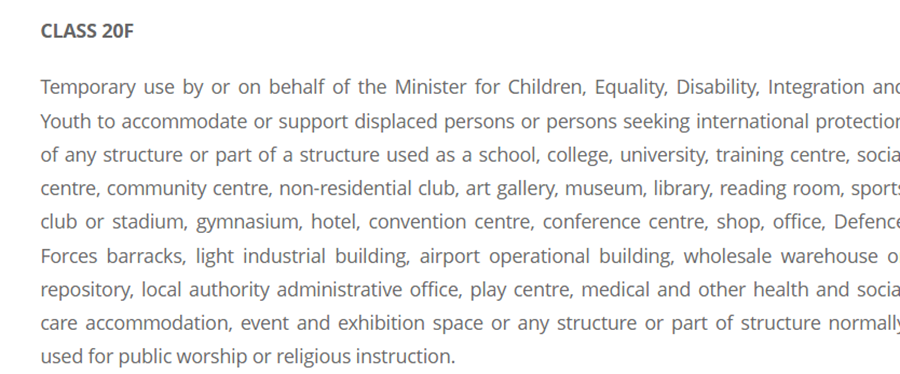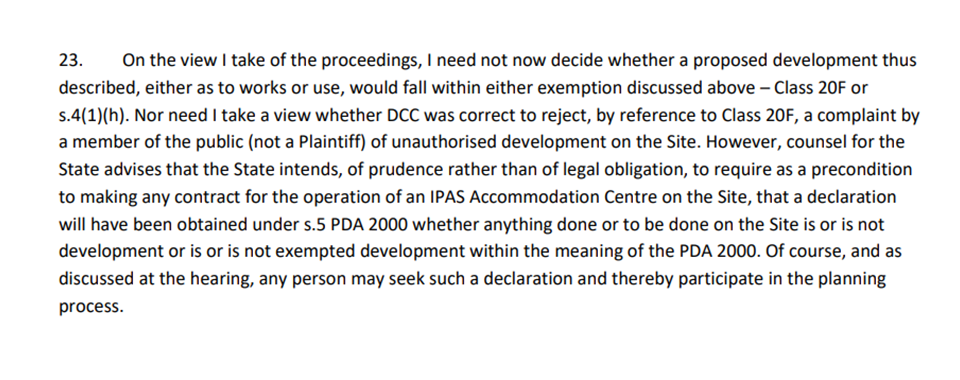One of the planning-related applications made to Dublin City Council before Christmas was from Townbe, the company that is seeking to open an accommodation centre for applicants for International Protection at the former Crown Paints factory site in Coolock.

It requests Dublin City Council to state whether or not Townbe is exempt from the normal planning guidelines because the proposal is to use the site to install an IPAS centre and therefore normally exempt due to S.I 376/2023, that was issued by Minister Darragh O’Brien in July 2023 and inserted a new section, Class 20F, into Schedule 2 of the Planning and Development Regulations 2001.

To date, companies like Townbe and others who have altered the use of existing buildings, or sought to construct new temporary structures, for the purpose of accommodating people claiming asylum have been confident that notification that they were applying for such exemptions from the local authority was a formality.
However, the fact that the state has conceded to Westmeath County Council regarding their objection based on pre-existing powers of the local authority seems to have made the developers rather nervous. Hence, perhaps, the flurry of such requests to Dublin City Council and possibly other local authorities requesting clarification.
It would also appear to be the case that Townbe may be perhaps disturbed by references to Class 20F in a High Court judgement delivered last October on a request for an injunction against the Townbe project in Coolock. Although the case made by the Plaintiffs made no reference to Class 20F, Townbe had notified DCC in April 2024 that they were applying for an exemption under that part of amended Regulations.

They intended to commence work on May 1 last, but that plan was frustrated by large and continued protests at the site organised and attended by members of the local community. Justice David Holland accepted that Townbe’s only obligation was to notify the Council, and that the Council did not have the right to deny the application.
Justice Holland did, however, state that: “No doubt, if DCC disagrees that Class 20F applies it could, in the first instance tell Townbe of its view and, in the second, take enforcement proceedings against the development if needs be – as could any other person.”
Which, one might think, makes it all the more interesting that Townbe and others have felt it necessary, since the October High Court decision, to specifically request that DCC state whether or not the exemption applies to all aspects of specific proposed IPAS centres including renovations.
As we noted on Tuesday, one such request made in relation to a proposed centre in Dublin 7 was declared by Dublin City Council on December 9 to be exempt “from the requirement to obtain planning permission under Section 32 of the Planning and Development Acts 2000 (as amended.)”
Perhaps then, Townbe and the other potential accommodation providers took note of Justice Holland’s reference to it being open to Dublin City Council to reject the claim that the proposal was exempt under Class 20F and to “take enforcement proceedings if needs be – as could any other person.”
Which tells us a number of things. Firstly, that apart from Westmeath County Council on the initiative of one Councillor, Paul Hogan, no other local authority has to date successfully challenged any asylum accommodation centre on grounds related to planning and the suitability of any premises for such use. Few others have even attempted to halt a centre on planning grounds. Therefore, every challenge is going to highlight some possible deficiency or weakness.
Secondly, it shows that in the absence of this proper scrutiny of proposals to put people into prefabs or even large tents, that the only obstacle in the way of all of this up to now has been spontaneous local opposition and protests.
It is, of course, true that citizens have the right and the capacity to take legal cases, as did the three plaintiffs in the attempt to secure an injunction against Townbe at the Crown Paints site. It can be an expensive process and is one that pits the ordinary citizen against a system which is clearly not a warm house for those challenging a central part of current state policy.
It also involves knowing how to deal with a legal profession that has by and large shown unusual favour to those advocacy NGOs and others who wish to further liberalise rather than restrict the current asylum system and structures. The system as it stands has been hugely lucrative for the legal profession.
In the absence of any meaningful political support if the recourse to law is taken then persons doing so need to have all their ducks in a row. One such duck in regard to Crown Paints was also pointed to, perhaps, by Justice Holland when he stated that “As to the scope of Class 20F, it expressly exempts only the use of a structure. It does not expressly exempt any works required to prepare the structure for such use.” It would appear that Dublin City Council accepted this during the course of the case referred to. And clearly, it still has to make a decision going by the latest application submitted by Townbe.
This has clear implications for the Crown Paints site as its use to place accommodation temporary or otherwise would require – according to some who have researched the issue -considerable expertise and care to ensure that asbestos removal is carried out in a proper fashion. Gript understands that there may very well be further challenges related to the safety and suitability of the site, including as that relates to the asbestos.
It is also worthy of note that Justice Holland said in part of his decision that the State intended from then on, presumably as a consequence of the case and the issues raised, that it would require further evidence from developers of proposed accommodation sites in relation to site works.
Which again proves that unless decisions are challenged and not as has been the case failed to be properly scrutinised by elected representatives and Council officials then there is little or no onus on the part of the developers to do anything other than comply with the bare requirement to notify. And in the case of securing IPAS accommodation contracts readers of Gript will know that these are pretty minimal in every aspect from planning to ownership.

It ought also be noted that Justice Holland referred to the rejection by Justice Richard Humphreys of an attempt by Leitrim County Council to prevent a company called Dromaprop from using the Abbey Manor Hotel in Dromahair to accommodate asylum applicants.
Humphreys allowed that Dromaprop could claim the Class 20F exemption for the use of the hotel, but that they were still subject to the normal regulations regarding “internal works.” However, in a separate but related case he rejected the Council’s argument that Dromaprop was not compliant with regards to building certification.
It is interesting, too, that while both the plaintiffs in the Coolock case and Leitrim Council Council failed to halt the centres, that by objecting at all they forced the Court to make a serious examination of the issues at stake, even where not central to the objections themselves.
However, the lack of a stronger case – and this is no reflection at all on either the Coolock people or Leitrim County Council – has allowed the judges in both cases to indulge in what some might regard as opinion that was more ideological perhaps than strictly legal.
It will be interesting to see what the next months will bring.